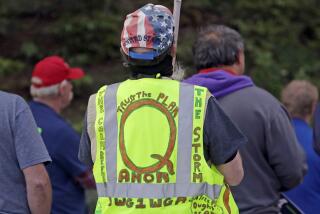‘Trust Us’ Doesn’t Quite Cut It
- Share via
If Osama bin Laden or any members of his Al Qaeda organization were to be brought to trial for the mass murders of Sept. 11, we would know the proper standard of proof in a U.S. court. The prosecution would be required to introduce admissible evidence establishing beyond a reasonable doubt that each defendant was guilty under existing criminal statutes.
But our government is now contemplating military, rather than judicial, action, and we are hearing demands to disclose the evidence on the basis of which Bin Laden and his associates are being targeted. The administration has disclosed at least some of this evidence to certain allies, but has refused to make it available to its own citizens, who want to be certain of the facts before they are willing to support military action that will endanger the lives of U.S. soldiers and foreign civilians.
British Prime Minister Tony Blair has assured the world that the evidence is “incontrovertible.” NATO has announced there is “clear and compelling” proof. High-ranking members of our own administration have implied they are aware of convincing evidence that would justify a military response.
Yet some skeptics recall that in past confrontations we have been misled by our government. When President Johnson assured the world that the U.S. spy ship Pueblo was in international waters when fired upon in 1968, he was not telling the truth. The ship was inside North Korean territorial waters.
History teaches that truth is often among the first casualties when a nation is preparing to take military action. Sometimes truth must suffer for compelling reasons: We should not alert military enemies to truths that will advantage them or disadvantage us.
Often, however, this military justification is used as a cover for untruths or silences that have no plausible national security justification. For example, information is sometimes withheld because its disclosure would be embarrassing to people in authority. That is certainly a possibility here because it is widely believed that a massive breakdown in intelligence and security may have contributed to the catastrophe, and disclosing evidence against Bin Laden might show that our intelligence agencies had sufficient information before that date to have anticipated and prevented the attacks. In the current situation, the Bush administration is implying that if it were to disclose to the U.S. public the compelling evidence against Bin Laden and his network, it would be compromising intelligence sources and giving comfort to the enemy. Maybe yes; maybe no.
How, then, are Americans to evaluate the competing claims of national security against the important need for an informed public? In such a competition, the government always has the advantage because the public and the media are rarely in a position to second-guess claims of national security.
Yet history teaches that we should not simply accept everything the government tells us at face value. “Trust us” is not the appropriate slogan for a democracy with a free press and a healthily skeptical populace. Even during periods of crisis, we have a right-indeed, an obligation-to know enough to be able to evaluate governmental decisions.
At the very least, the U.S. public should be given the general outlines of the evidence, without telltale leads to vulnerable sources. For example, there have been press reports of intercepted phone messages shortly after the disasters, as well as a report of a phone conversation between Bin Laden and his mother on Sept. 10, the day before the attacks. There also have been suggestions that certain people with ties to Bin Laden seem to have been aware of some of the targets the day before and made investment decisions that profited from the disasters. Now we are hearing of meetings and monetary transactions between Bin Laden associates and several of the hijackers. These and other bits of information, if true, would go a long way toward establishing an evidentiary foundation for certain types of military action.
Several prominent commentators have warned against confusing the evidentiary standards required for a criminal conviction with those required for military action. They are correct. But it does not follow that there are no evidentiary standards required for military actions that may take more lives than any courtroom proceeding.
The mass murders of Sept. 11 are unprecedented. Generally we know with certainty which nation has provoked us. Our response to these shadowy criminal acts and the evidentiary basis on which it is made will establish enduring precedents.
Only an informed public can serve as a check and balance against governmental action involving the lives of so many.
Alan M. Dershowitz is a Harvard law professor.
More to Read
Sign up for Essential California
The most important California stories and recommendations in your inbox every morning.
You may occasionally receive promotional content from the Los Angeles Times.













